
19 minute read
April 22 LiveStream Webinar: The Banking Relationship
April 22, 2021 | 1:00 pm – 2:30 pm Echo
The Banking Relationship
The importance of a strong banking relationship in your HOA
2021
At Echo we know the ways to market your business have changed. Echo’s opportunities for business success have changed to meet your needs!
TICKETS
2021 VIRTUAL, DIGITAL & PRINT MARKETING OPPORTUNITIES(408) 297-3246 www.echo-ca.org Homeowner or Board Member: FREE Professional Service Providers & Managers: $20
Register at www.echo-ca.org
I HAVE I HAVE OUTSTANDING OUTSTANDING RATES RATES AND HOA AND HOA COVERAGES.COVERAGES.
Hi, my name is Kevin Boland and we have probably met at many ECHO panels over the years. I offer Guaranteed Replacement Coverage so smart boards can protect buildings from wild/urban fires no matter what the cost is to rebuild today! Hi, my name is Kevin Boland and we have probably met at many ECHO panels over the years. I offer Guaranteed Replacement Coverage so smart boards can protect buildings from wild/urban fires no matter what the cost is to rebuild today! Give me a call for a professional bid on your HOA insurance and save! Give me a call for a professional bid on your HOA insurance and save!
Kevin Boland, LUTCF, AIC, CIC Kevin Boland, LUTCF, AIC, CIC
CA License # 0C33871 1202 Grant Ave., Ste. E, Novato, CA 94945 CA License # 0C33871 1202 Grant Ave., Ste. E, Novato, CA 94945
Call 415.898.4370 today! kboland@farmersagent.com Call 415.898.4370 today! kboland@farmersagent.com
www.KevinBolandInsurance.com Restrictions apply. Discounts may vary. Not available in all states. See your agent for details. Insurance is underwritten by Farmers Insurance Exchange and otherwww.KevinBolandInsurance.com affiliated insurance companies. Visit farmers.com for a complete listing of companies. Not all insurers are authorized to provide insurance in all states. Coverage is not available in all states.Restrictions apply. Discounts may vary. Not available in all states. See your agent for details. Insurance is underwritten by Farmers Insurance Exchange and other affiliated insurance companies. Visit farmers.com for a complete listing of companies. Not all insurers are authorized to provide insurance in all states. Coverage is not available in all states.
BY KATRINA SOLOMATINA, ESQ.

EMERGENCY PREPAREDNESS

IN CALIFORNIA HOAS
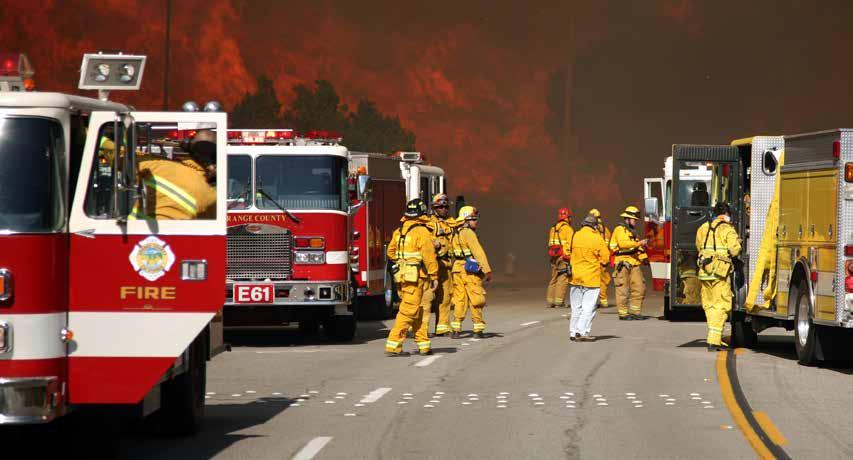
PREPAREDNESS
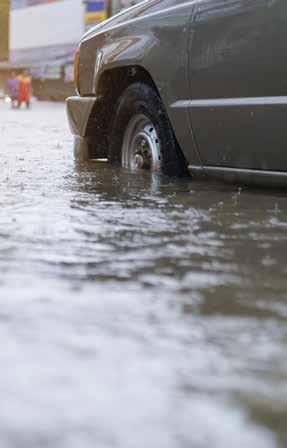
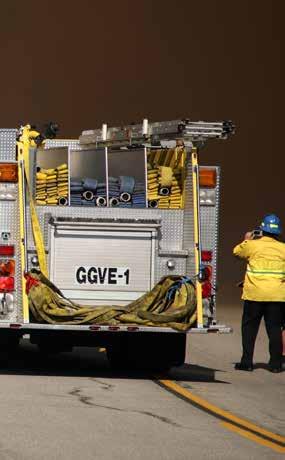
THE THREATS
California is used to wildfires. But the Golden State’s record-breaking 2020 wildfire season was particularly brutal. A blistering heatwave fueled dozens of simultaneous fires – conditions that spurred Gov. Gavin Newsom to declare a statewide state of emergency. Tens of thousands of people were evacuated from their residences. But that was not – and is not – the only threat California residents face. The heavy rains earlier this year caused a collapse of a portion of Highway 1 near Big Sur due to a “debris flow” of trees, boulders, water, and mud, leaving behind a 150-foot-wide gap. Thousands of Monterey County residents were impacted by evacuation orders. The COVID-19 pandemic has also caused many residents to question whether the common facilities they share with others are safe and to consider how to respond to an outbreak in their community.
Continued on page 18
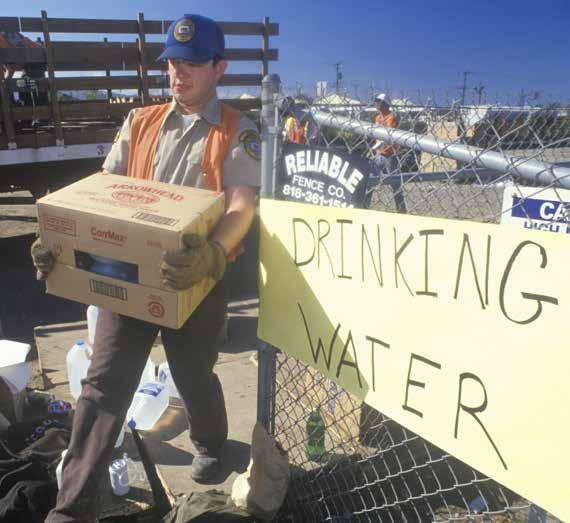

Trusted Paints. Quality Results.
Benjamin Moore offers a comprehensive lineup of interior and exterior residential products to suit a wide interior and exterior residential products to suit a wide range of needs, specialties and budgets, along with the range of needs, specialties and budgets, along with the best selection of color in the business. Homeowners and best selection of color in the business. Homeowners and paint professionals have trusted our unmatched quality paint professionals have trusted our unmatched quality and long-term results since 1883.
Put Benjamin Moore® paints to work for you.
Contact Pam Marsh HOA Paint Specialist at 415-686-9342 or pamela.marsh@benjaminmoore.com. 415-686-9342 or pamela.marsh@benjaminmoore.com.
©2017 Benjamin Moore & Co. Aura, ben, Benjamin Moore, Color Lock, Paint like no other, Regal, and the triangle “M” symbol are registered trademarks licensed to Benjamin Moore & Co. and the triangle “M” symbol are registered trademarks licensed to Benjamin Moore & Co.
17-15869_Echo Journal Ad_5.1875 x 2.312_v2.indd 1 4/12/17 8:39 AM
PAINTING & GENERAL CONTRACTOR • LICENSED, BONDED & INSURED
A natural disaster can strike a community at any time. It can occur in a moment or gradually over time. In either case, most community associations are illprepared for the consequences. In most associations, disaster insurance is inadequate or nonexistent, and there is often little reserve funding that can be tapped to rebuild the development.
Regardless of whether they are dealing with landslides, mudslides, fire, flood, earthquake, civil unrest, or a pandemic, every community association should have a plan in place that is unique to its common-interest community. Most community associations lack the most basic level of response: a written emergency plan.
The End of the Road?
If the past year has taught anything, it is that HOAs need to be better prepared for a disaster and that having an emergency plan is the first step on this long, winding road. Identifying exposure, creating a plan, implementing the plan, and updating and practicing the protocols of the plan are all bricks used to be prepared and to build a successful road.
Specializing in Homeowner Associations
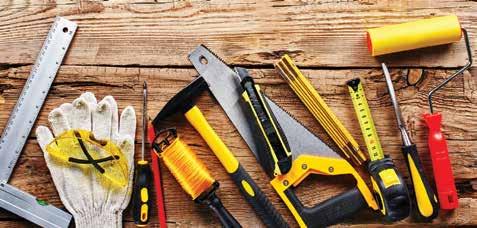
Property Maintenance • Construction • Free Estimates Interior/Exterior Painting • Wood Rot Repair • Patios & Decks
831.277.7497
Katrina Solomatina, Esq. serves on the Echo board of directors and is a member of other industry associations.
Investigate the Exposure to the Association
Community associations or owners’ associations (referred to here as “association”) are generally defined as nonprofit organizations (either incorporated or unincorporated) formed to manage planned communities, such as condominium or master-planned developments, and to enforce their governing documents. The owners of lots or units are the members of the association. It is important to mention that associations are not organized to benefit individual members. Rather, an association’s duty to its members is to ensure that the property and the common areas (including common structural elements, access points, lobby, and amenities) are safe and secure. In addition, even though an association is not responsible for and cannot guarantee its residents’ personal safety during a time of crisis, the failure to have a community-wide plan to respond to an emergency may create potential liability for the association, as members look to the association’s board for direction in times of disaster.
This is where the emergency response plan provides the greatest benefit. Associations looking to create an emergency plan should retain experts to investigate the vulnerability of their project to potential natural disaster, the need for heightened cleaning, vendor and contractor access, and the closure of certain amenities. Consulting with and getting input from the association’s outside property management company is also important. For example, some of the more at-risk developments are older buildings, developments with hillside common areas, proximity to the San Francisco Bay or the ocean, developments constructed on engineered fill or bay mud, and those having only one access road. Therefore, given current events, it is more important than ever that associations spend the time and resources necessary to have a comprehensive plan in place so that it is available to everyone in times of disaster.
Review the Association’s Insurance
A review of the insurance of the association is imperative to prepare for a disaster. If the insurance is inadequate, it is best to make that determination before a disaster. After the disaster, an association will be responsible for repairing the common area regardless of whether it was insured. Even if the association is well funded, major repairs may have to be funded through a special assessment of the members. So, an assessment of the association’s insurance and reserves policy before disaster strikes could potentially prevent major expenses or the need to go through a special assessment at a later time.
Review the Governing Documents
A review of the governing documents of the association will help to identify potential areas of concern, such as whether an association has a right to come onto members’ property to clear debris and other damage or whether there is a specific time frame within which the Association would have to rebuild common areas.
Create an Emergency Plan
An emergency preparedness committee can help an association create, review, and implement an emergency preparedness plan. The members of such a committee may serve as points of contact during the disaster. In addition, they can have access to all the necessary service provider phone numbers to summon immediate help when a disaster strikes. The plan, once in place, should be regularly updated and kept available on the association’s website, at its community management office, and/or at other locations where members can readily access their association’s important documents.
Educate Association Members about the Plan
Once the plan is created and adopted by the board, the association should distribute the plan to its members and consider holding one or more training sessions. The association should also educate members and residents concerning responsibility for their own safety and how to function without community management or services. In addition, an important step for an association is to determine how communications will be handled during an emergency if the power goes out or if there is no internet or phone connection. Associations should look to establish basic owner contact processes, such as a central information hub or notes on residents’ doors.
GOVERNANCE LESSONS FROM THE PANDEMIC
IN MARCH OF 2020, CALIFORNIA BEGAN ISSUING STAY-AT-HOME ORDERS FOR NON-ESSENTIAL WORKERS. WHAT MANY BELIEVED TO BE A TEMPORARY SHUTTERING OF CALIFORNIA’S ECONOMY TO SLOW THE SPREAD OF COVID AND ALLEVIATE PRESSURE ON HOSPITALS BECAME A YEAR-LONG PROCESS OF ADAPTING TO ISOLATION, WORKING FROM HOME, TEACHING CHILDREN AT HOME, AND EXPERIENCING ECONOMIC UNCERTAINTY.

California’s homeowner associations were not immune to this upheaval and are still impacted significantly by COVID. HOAs have had to navigate challenging situations including closing community amenities, moving meetings online, deferring projects, and holding elections virtually. Adaptability has become a virtue, with new technologies adopted to enhance online meetings and events. Against this backdrop and regardless of the challenges, HOA governance continues, with budgets prepared and approved, reserve studies updated, assessments collected, rules enforced, bills paid, and projects considered. As vaccination rates increase, California businesses are beginning to reopen and consider return-to-work dates and policies. HOA boards of directors are also considering how reopening will affect their communities, association members, and governance. Self-managed HOAs can benefit by reviewing important lessons learned from the pandemic. These lessons include the following:
KNOW THE IMPORTANCE OF A RISK MANAGEMENT PLAN.
Managing risk is a proactive planning and preparation process. It must be deliberate and scheduled and must result in risk management policies and procedures. Risk management planning can also act as a backstop for board members and staff when they’re faced with member pressure to open amenities or attend meetings and elections in person. A specific policy worth considering is a board and community policy for responding to emergency orders from state and local leaders. This
policy could include provisions for closing or curtailing operating hours for community amenities, reducing staff, and moving meetings and elections to online virtual formats.
SCHEDULE A PANDEMIC DEBRIEFING WITH KEY VENDORS
AND SERVICE PROVIDERS. As stay-at-home orders are relaxed and businesses begin to return to normal, key vendors and service providers can provide valuable insight to boards as they consider relaxing COVID-inspired rules. Attorneys and insurance agents knowledgeable in HOA governance can inform board members and help them to be up to date on managing insurance risk and exposure, as well as legal considerations for new rules and guidelines for amenity use.
Scheduling touch-base meetings with landscape maintenance vendors and janitorial service providers can help boards navigate and manage expectations for community care and post-pandemic cleanliness and sanitizing standards.
START PLANNING FOR INPERSON BOARD MEETINGS.
California’s Open Meeting Act sets limits and requirements for boards, stating that the board must post the date, time, and place of meetings. The act also sets strict limits for boards meeting electronically or by conference call. As reopening progresses, boards will be under pressure to return to in-person board meetings. Now is a good time to begin a conversation with the community attorney to proactively establish guidelines for reconvening in-person meetings, and hopefully keeping some of the efficiency and productivity afforded by the online meeting format. This is also a good time to create policies and procedures for how to convene board meetings during declared emergencies.
RECONSIDER DEFERRED
PROJECTS. During the pandemic, many boards deferred or postponed common-area projects or improvements because of vendor uncertainty and state and county guidelines for essential workers.
With skilled workers hard to come by, construction-related trades will be hard-pressed to keep up with demand. Boards that have deferred commonarea maintenance or repair projects should begin as soon as possible requesting updated bids, estimates, and project schedules. If the HOA is due for the threeyear reserve study update, the HOA board should schedule time with a reserve specialist, and adjustments should be made, if necessary, to account for deferred reserve projects. If the HOA is simply doing an annual update and summary disclosure, it may be necessary to disclose that projects have been deferred and in which year the deferred projects will be conducted.
Many members are looking forward to returning to exercise rooms, pools, spas, tot lots, bocce courts, and social gatherings. Community amenities and outdoor common areas will need to be inspected and have maintenance and deep cleaning completed before reopening.
CONSIDER AND ESTABLISH POLICIES FOR VOLUNTEER STAFF, EMPLOYEES, AND THE GENERAL
MANAGER. As the pandemic crisis recedes and HOA business and activity becomes normalized, this is a good time for the board to discuss its expectations and requirements for volunteers and staff during emergencies. It is recommended that boards perform an assessment by interviewing volunteers and staff members and holding open discussions that honestly evaluate the challenges encountered and how they were overcome. As part of the assessment, existing technology and tools should be considered – what worked and what didn’t? Are there modest investments in technology and tools that would better prepare the HOA for another emergency? The assessment should take a deep dive into how the association can be better prepared and what investments can be made to facilitate remote work, community communication, and the health and safety of the HOA.
The last 12 months have been stressful and demanded outof-the-box thinking from HOA boards and management staff. Overall, California’s homeowner associations have done a great job continuing business as usual. HOA boards of directors and volunteer leaders should take a bow for adjusting, adapting, and continuing good governance. Well done!
John Cligny, AMS, PCAM, CCAM-HR, is a veteran portfolio manager and community association management executive. As co-founder of Association Consulting Group, John is a trusted advisor primarily focused on educating and advising community association board members on effective governance to promote a positive public opinion of homeowner associations and community management. John is a frequent speaker and panelist on a wide range of community association topics and issues.

Private property towing specialists
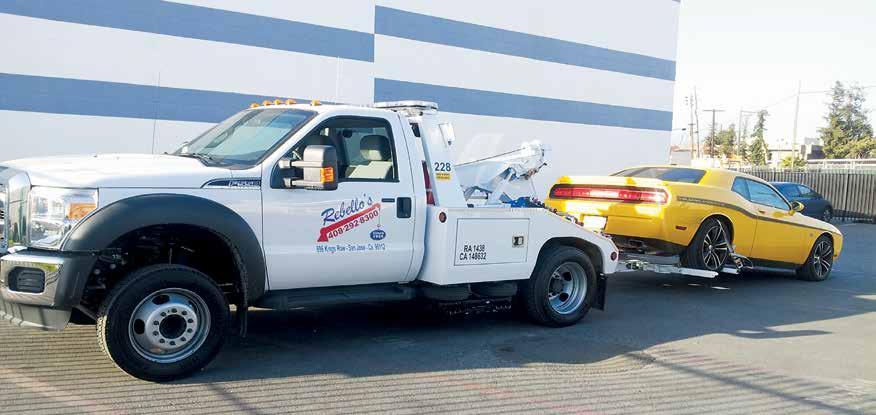
THE REBELLO’S DIFFERENCE
• 24 Hours / 7 days a week • 20 Minute response time • Uniformed, polite, professionals • Licensed with indemnity insurance • Fire lane tour and tow • Parking permit enforcement • Insurance compliant with - Compliance depot - Registry monitoring • Customized parking permits • We have a city business license, and a special use permit to perform private property towing.
Our Drivers:
• Are licenced with the city of San Jose • Are licenced by Bureau of
Security and Investigation • Are paid hourly and never a comission • Must pass a rigorous three month training program • They must pass traffic incident management training
Free to Qualified Property Managers:
• Fire lane painting and maintenance • Parking permits to go with your parking program • Omadi login, on our website, for instant access to tow info and pictures
Ask Us How To Reduce Risk, Minimize Complaints and Eliminate Aggressive Towing
CID CONSORTIUM, LLC

Since its inception, CID Consortium, LLC (CIDC) strives to provide excellent financial and operational guidance to communities, board members, managers, and owners of communities big and small in an everchanging environment.
We believe in building relationships by doing our business transparently and keeping our clients informed. Before sending a proposal, we take the time to uncover what success looks like for your community. Once we are aligned, we will propose a combination of Governance, Finance, and Organizational services specific to your unique needs.
Owners and operators Donald (”Don”) W. Haney, CPA, and Adam P. Haney, CPA, are well known for their role in developing homeowner association industry standards and technology. Don originally started in the industry in 1979 when he formed two corporations: CEO, Inc. and Haney Accountants, Inc. Both organizations laid the foundation for CIDC led by Adam P. Haney, CPA.
Today, CID Consortium, LLC has grown into a team armed with passion and expertise for improving the community living experience of its members. Pulling from 45 years of business, CIDC has accumulated a wealth of experience and expertise through a relentless pursuit of perfection. Fueled by technology and incessant process improvement, the team engages with members on a rich platform, ensuring the community living experience continues to be exceptional. For more information about the services we provide, please visit our website at cidcllc.us.

919 Reserve Drive Roseville, CA 95678 (888) 786-6000 cidcllc.us
• Landscaping systems installed as to survive for not less than one year (from close of escrow). (Cal. Civ. Code Section 896(g)(12).)
Four Year Limitations Period
• Plumbing and Sewers installed to operate properly and not materially impair the use of the structure (from close of escrow). (Cal. Civ.
Code Section 896(e).) • Electrical Systems installed to operate properly and not materially impair the use of the structure (from close of escrow). (Cal. Civ. Code
Section 896(f).) • Excessive cracks or significant vertical displacement in exterior pathways, driveways, hardscape, sidewalls, sidewalks, and patios (from close of escrow). (Cal. Civ.
Code Section 896(g)(1).) • Corrosion to untreated steel fences and adjacent components (from close of escrow). (Cal. Civ. Code
Section 896(g)(9).)
Five Year Limitations Period
• Paint and stain causing deterioration of building surfaces (from close of escrow). (Cal. Civ. Code Section 896(g)(10).)
If the statute of limitations period has otherwise run during the process, then from the time the homeowner provides the SB 800 Notice to the builder through 100 days after completion of repairs (if any), the statute of limitations is tolled/extended (Cal. Civ. Code Section 927).
IMPROVINGCOMMUNITIESTM
Your HOA Specialists
CA Lic. 963219 (408) 6385500
GENERAL CONSTRUCTION
Exterior Reconstruction/Decay Repairs Interior Renovations
ROOFING SPECIALTY
Roof Replacement Roofing Repairs
Request a FREE estimate online www.iqvinc.com
What to Do if You Suspect Construction Defects?
If the issues are minor, homeowners may be able to resolve them with the developer/ builder through their warranty or customer service department. However, if there are more significant/major issues, i.e., typically anything involving water intrusion through the building envelope, window failures, systemic plumbing or electrical problems or site soil settlement, then homeowners should engage competent construction defect counsel for assistance.
In addition, homeowners should have an independent forensic consultant evaluate the conditions, which should be coordinated through legal counsel. Many times, the developer/builder will offer to inspect the conditions or even pay for a ‘neutral’ thirdparty evaluation. Homeowners should be wary of allowing the developer/builder to direct or conduct the investigation as they have competing financial interests which do not typically align with the best interests of the homeowners.
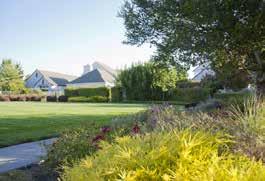
(800) 891-7710 www.cagwin.com
License #: 202399
We Know Homeowners Associations
Locally owned and operated since 1955 Site walks with your account manager 24-Hour emergency response
J. Spencer Edgett, Esq. is a partner with Chapman & Intrieri, LLP and has represented community associations for more than 15 years, both as general counsel and in pursuing claims against developers and contractors for construction defects. Chapman & Intrieri has offices throughout California, providing practical and cost-effective legal solutions designed to meet our clients’ objectives and exceed their expectations.
PROFESSIONAL ASSOCIATION SERVICES (PAS)
Our Values: Service • Professionalism • Integrity • Partnership • Trust
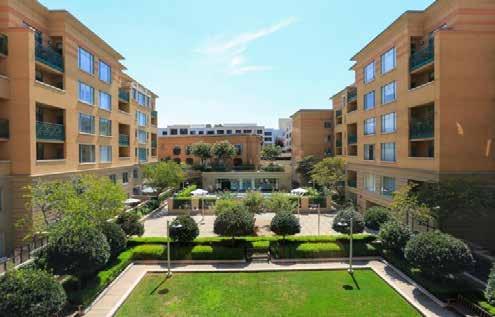
Professional Association Services (PAS) is a locally-owned management company that takes pride in providing proactive professional services for common interest developments in Northern California.
Our community managers are credentialed through CAI and CACM and our entire team of Managers and Assistant Managers are enrolled in a continuous educational path in the Association Management industry.
Our business is based upon the application of established best practices within the community associations industry. From professional business, governance, bookkeeping and community management services, to leading Internet and software solutions, we offer a complete and unsurpassed solution for our clients.
Some of our specialties are: • Tailored solutions for your community
• Experienced in facilitating effective board meetings • Modern communication tools, powerful resident web portal, BOD online action item tracking • Electronic records retention • Customer service, walk-throughs, correction letters, follow-up and timely reporting Additional services offered: • Inspector of Elections • Expert Witness • Mediation Services
Professional Association Services was founded in 1990 with services focused in the South and East Bay areas. In 2016, PAS acquired a management firm in the Oakmont area of Santa Rosa, expanding our presence into the North Bay with a Santa Rosa branch office.
The PAS team does not provide a standard cookie-cutter approach of preformatted policies and recommendations as these very rarely fit an individual community – this is why we examine the facilities, finances, policies, contracts and projects of a community, then partner with each client to determine what works best for that specific community as an individual entity. PAS can provide the flexibility and local personal attention that your board is looking for. We believe local is better for our communities.
PAS is a leader in professional management and holds the AAMC accredited management firms designation through Community Associations Institute (CAI), and exists to promote well-managed communities.







